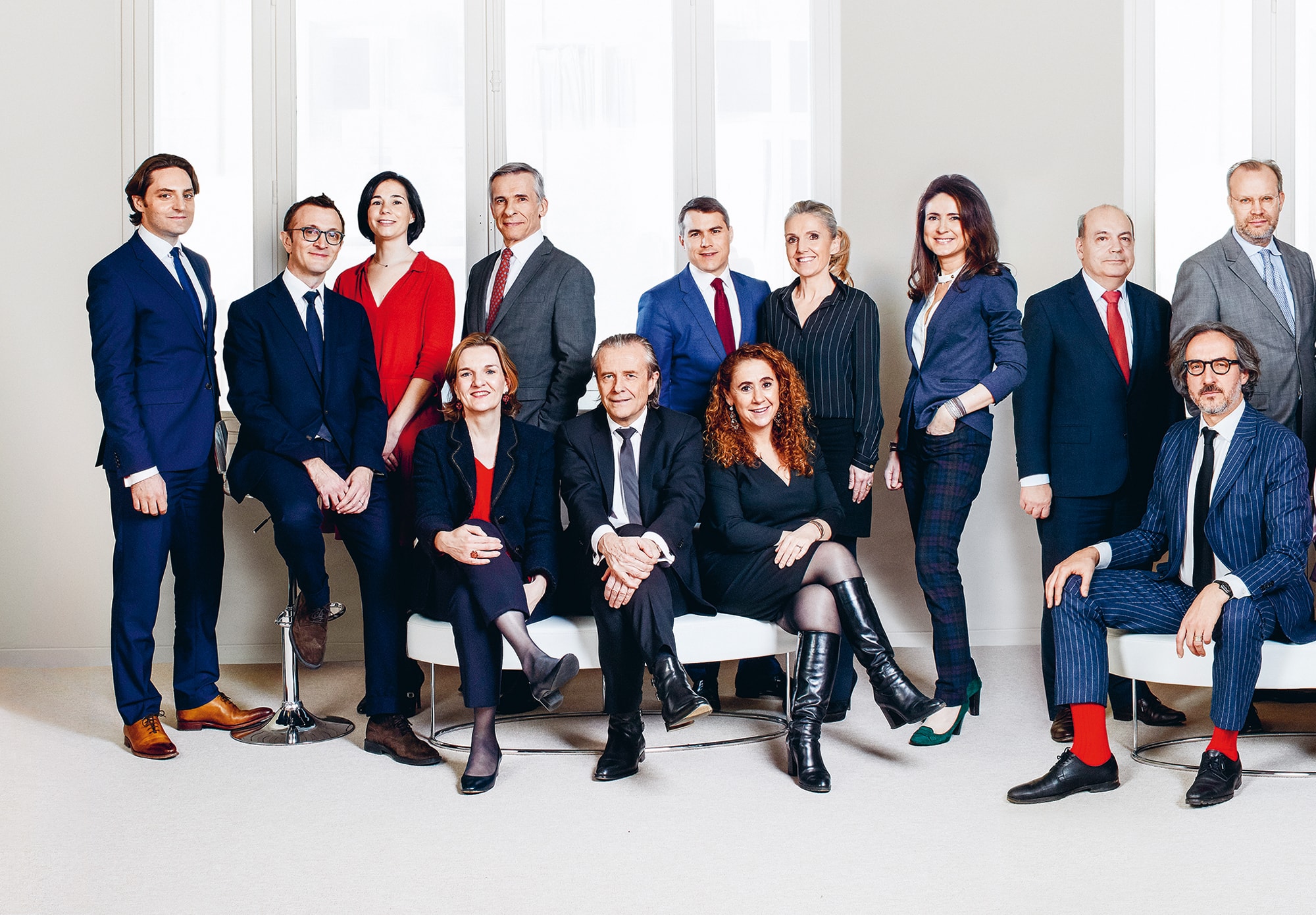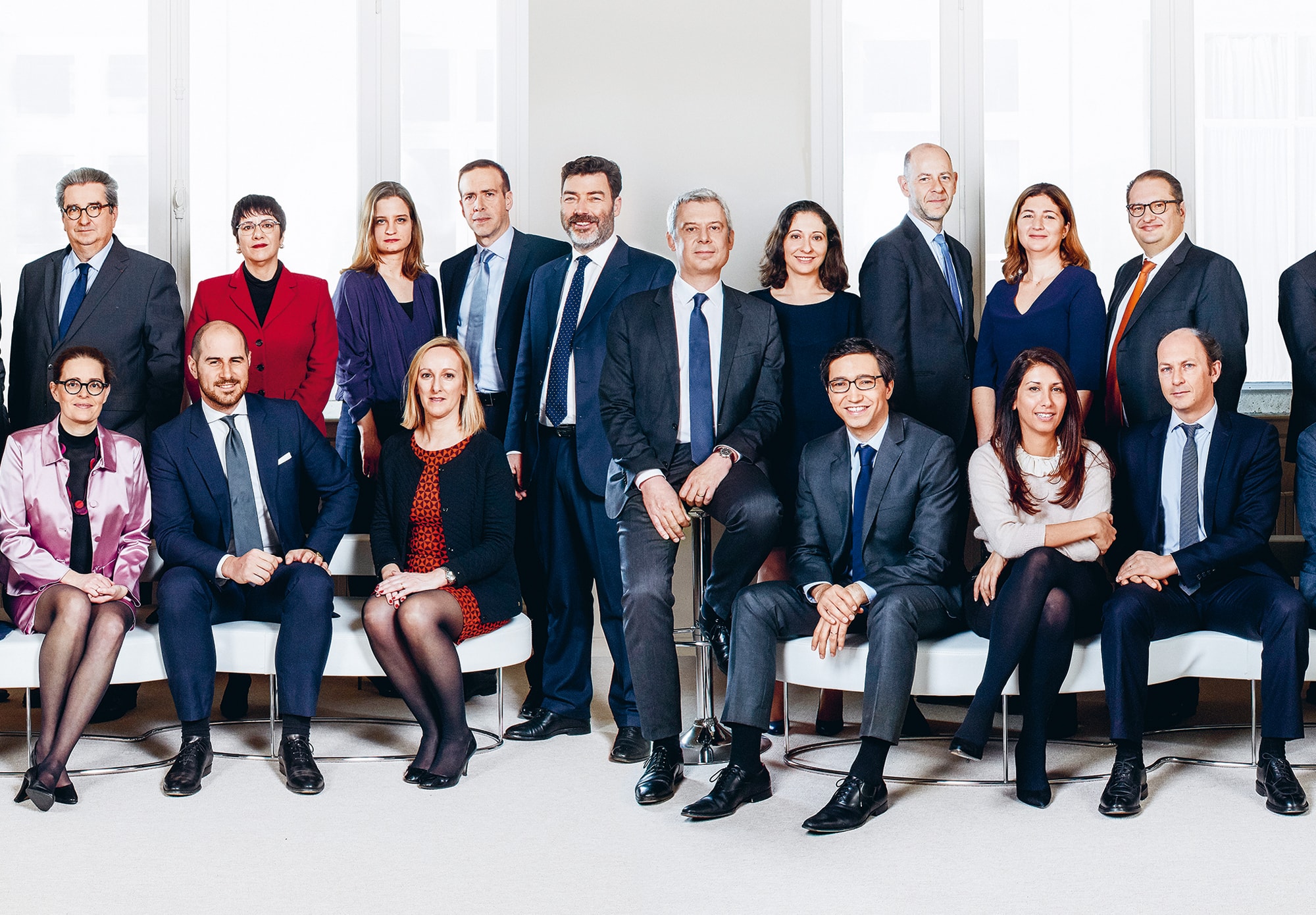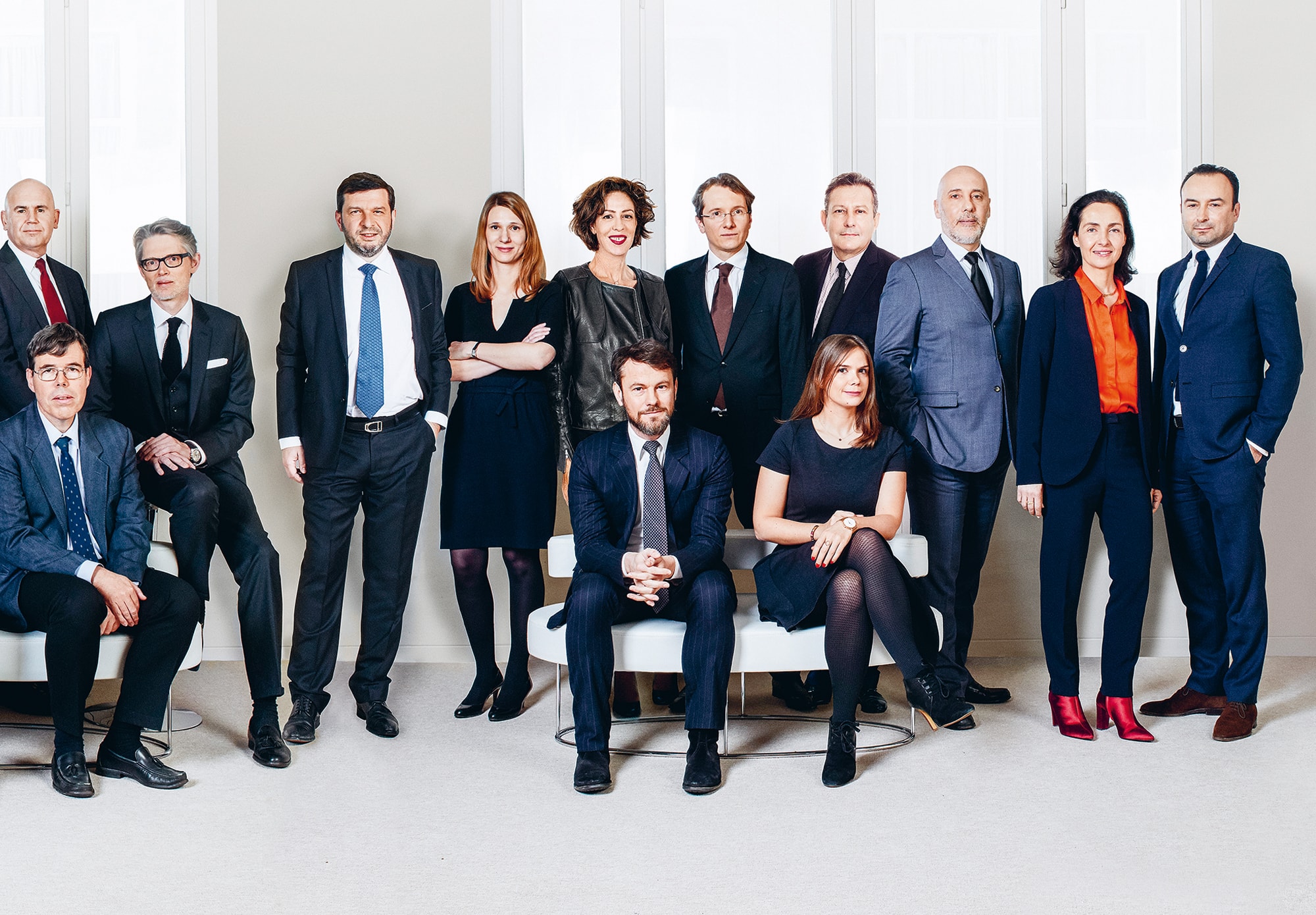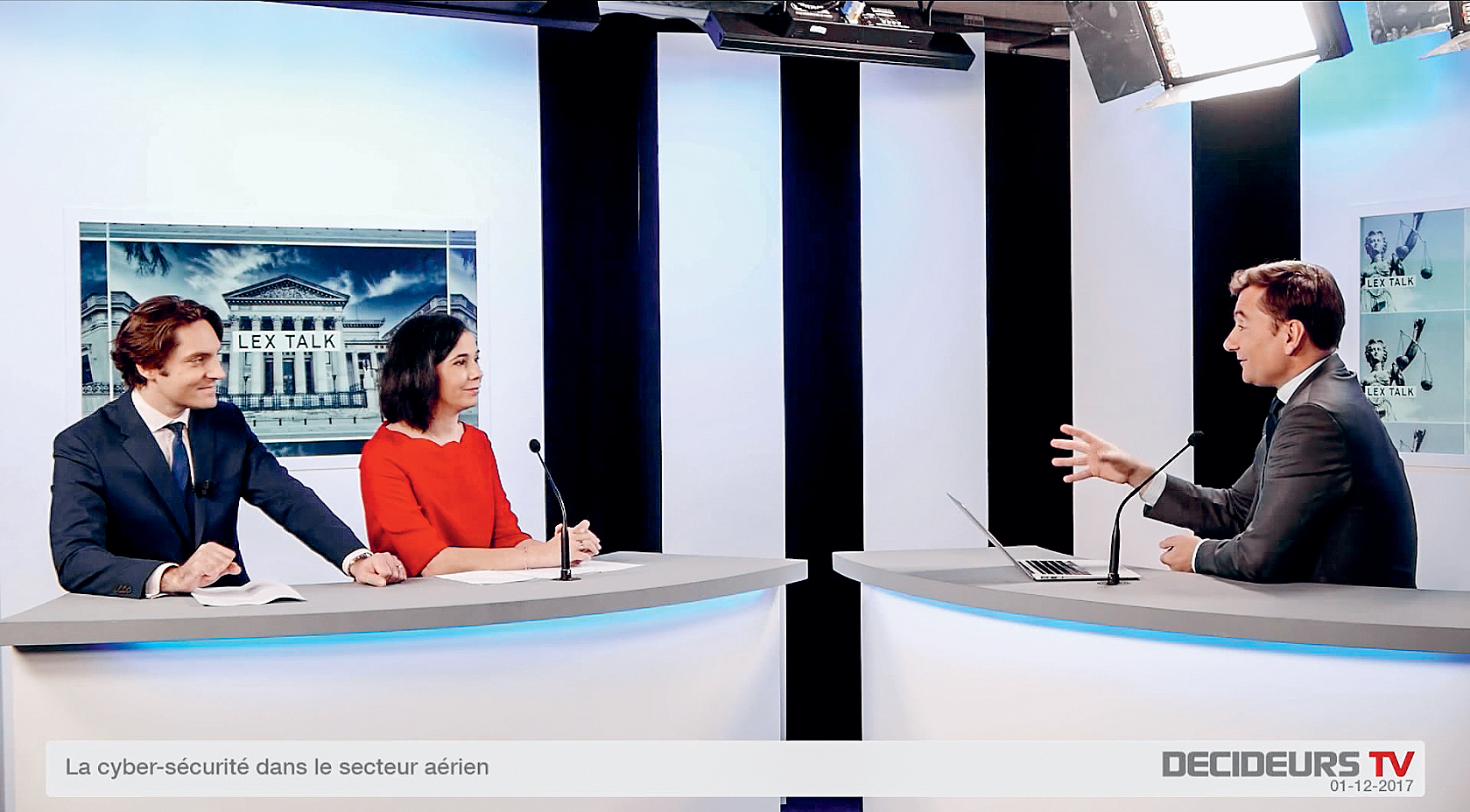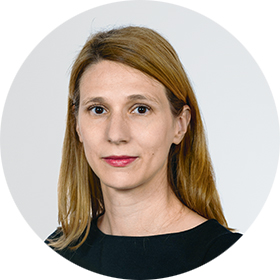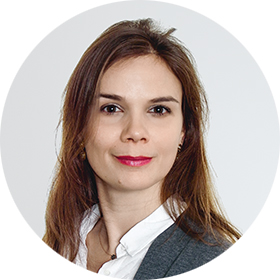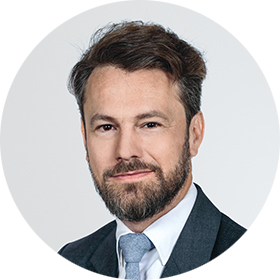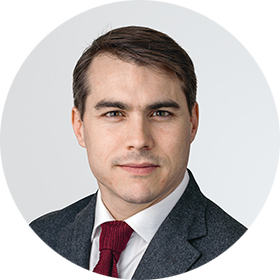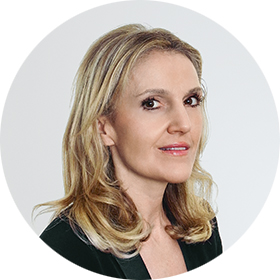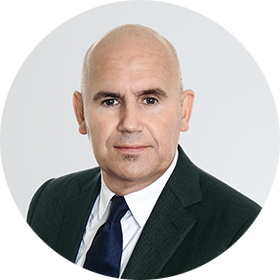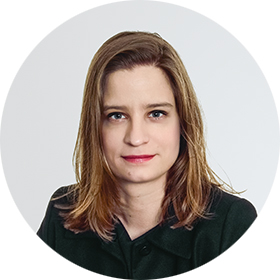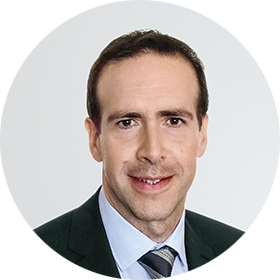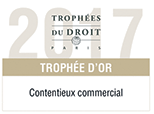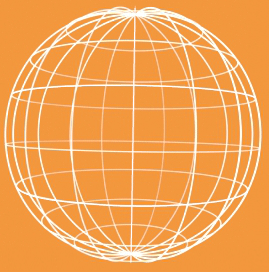Our Partners
Editorial

A business makes an impact through its ability to evolve and adapt to the needs of its clients: resilience when facing inevitable though unforeseen difficulties, and capacity to re-invest constantly in its knowledge base so as to move forward. This, we believe, is common sense. We worked hard to abide by these principles in 2018, and we intend to do even better in 2018.
In 2017, we demonstrated our capacity for transformation, customizing our services to our clients’ needs, be it by initiating an association of key players in the energy sector to reflect on and to structure an economic model for the energy transition, or by providing tailor-made support to help our clients achieve compliance with new standards and regulations to come. This year also marked the expansion of our geographical reach, with extensive work carried out in Sub-Saharan Africa and the Middle East.
2017 also gave us the opportunity to test the resilience of our firm and to preserve and further develop our business and expertise, proof of the integrity, sustainability and relevance of our model. De Gaulle Fleurance & Associés is a brand to be reckoned with in the legal market. It is currently a banner for people who fully express their talents in a cross-disciplinary and collaborative manner. The promotion of partners at the end of 2017 demonstrates that: two women and two men who have proven their drive in fields as diverse as administrative law, financing, mergers and acquisitions and new technologies. A further example of our strength is the recruitment and seamless integration of new partners and associates from in-house legal departments or other law firms in the media sector as well as in the economic regulation, competition and taxation.
De Gaulle Fleurance & Associés is a reliable brand for our clients who trust us with their day-to-day issues as well as their most sensitive matters.
Lastly, in 2017 we kept on investing to grow our knowledge base. We developed initiatives in several industries, including connected healthcare, artificial intelligence, transportation, asset and corporate finance, finance and insurance digitization, large sporting events, increasingly service-based real estate, ever more complex taxation, ever more challenging international arbitration, etc. And there were equally many cross-disciplinary projects, managed and developed by our lawyers thanks to the maturity of our full service capacity.
In 2018, we intend to continue and to accelerate our strategy of refining our offers and approaches to various market sectors in a “by design” combination of the expertise necessary to anticipate evolving needs, and therefore practices and legal rules.
Our world is changing, our clients’ needs are evolving; our law firm is a platform designed to support them within this permanent motion.
- Louis de GaullePresident

- Henri-Nicolas FleuranceGeneral director
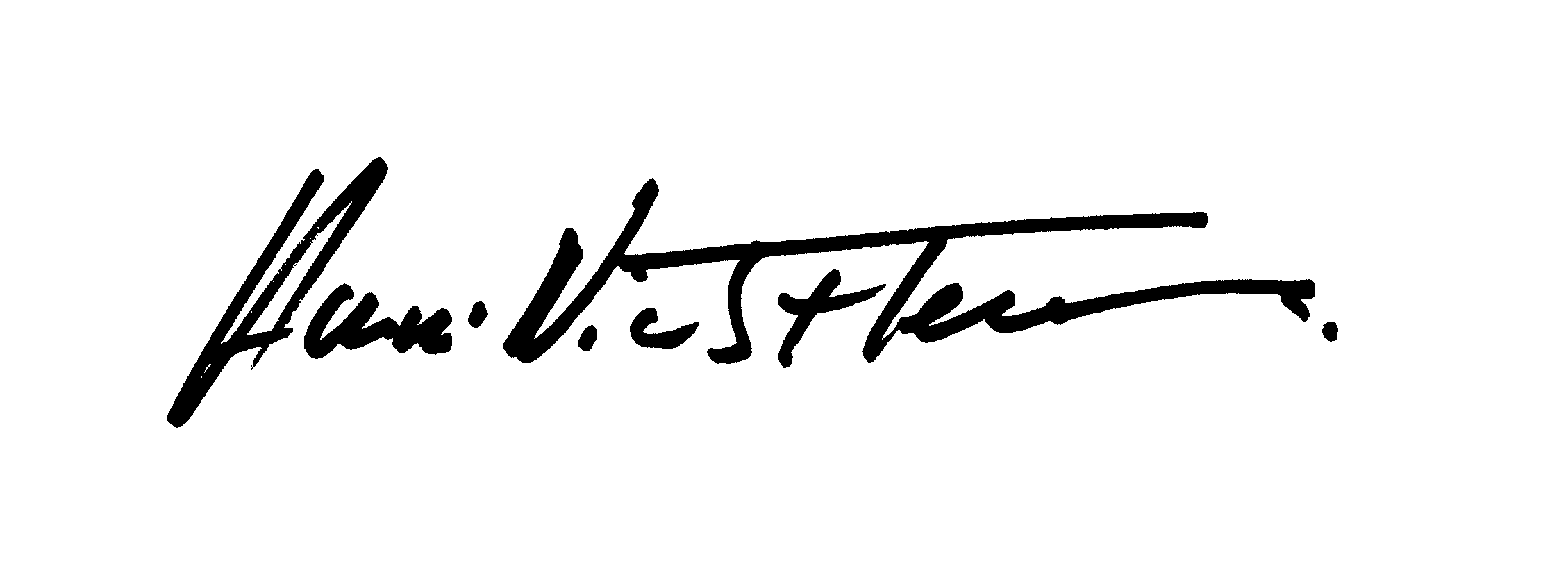
Figures
2017
MOVING ANNUAL AVERAGE
- 39.37million euros turnover
- +2.08%growth in turnover
- 42partners in 2017 (5 in 2001) en 2017 (5 en 2001)
- 149 teams members108 lawyers, of which 58 are women and 50 are men,and 41 staff, of which 10 are men and 31 are women
- 37.8average age in 2017(36.6 in 2001)
DEMOGRAPHIC EVOLUTION OF LAWYERS
AND STAFF
Market anticipation
anticipation
Compliance:
the law at new crossroads

Self-certification is one of the most significant legal trends of the year 2017. It was a pivotal year, with the considerable intensification of regulations thanks to the Sapin II Act and the next European regulation on the personal data protection (the GDPR). Thus, large sections of business activities (governance, human resources, etc.) and the economy (health, finance, transport, etc.) follow previously established compliance practices, particularly in competition law. To assure quality and responsibility, companies must from now on, be able to demonstrate their compliance with three basic concepts: transparency, corruption prevention and cyber security of personal data. This reversal of the burden of proof is a Copernican revolution for a large number of legal departments, not only in terms of internal organization but also their role within the company.
Corporate responsibility and compliance:
transition to the industrial era
According to the annual AMRAE (Association pour le Management des Risques et des Assurances de l’Entreprise [French Association for Corporate Risk and Insurance Management]) survey on the operational and contractual risks of companies, “compliance“ has now gone largely beyond the management of traditional risks: competition, dominant position, cartel, termination of negotiations, established trade relationships, corruption, conflict of interest, etc. Inflation of national and foreign regulations (for contracts in the accounting period) places ever greater criminal and financial responsibilities on companies and their managers, who now have to invest more in the workplace, on environmental protection or, more recently, implement ethical standards along the whole supply chain. Digitalization plays an increasing role: it certainly facilitates supplier management and the duty of care, but it also triggers new supervision standards (personal data, cyber security, etc.) and potentially increases the risk of adverse media exposure.
Duty of care: everyone concerned, especially in-house counsels
Companies can no longer simply display their ethical principles “towards human rights and fundamental freedoms, health and safety of persons and the environment”: about 150 large French groups, and also indirectly applies to their subsidiaries, sub-contractors and suppliers must also ensure that these are duly implemented. Legal departments play a strategic role in the implementation of these new provisions: risk-mapping, regular evaluation procedures, the appropriate actions for risk mitigation or the prevention of serious infringements, warning mechanisms, etc. Beyond that, to assess intent: in case of a legal action, the legal department will be able, for example, to demonstrate the specificity and relevance of the clauses included in sub-contractor and supplier contracts.
”Regulatory turmoil requires support combining data protection, anti-trust, anti-fraud, anti-corruption and financial regulation.”
The key word: awareness
In terms of these obligations, legal departments clearly have a preventive role towards the various business units and support functions—as well as the duty to remind them. If not done yet, they will have to rethink their organization and their processes and develop internal skills, in particular through the creation of “Risk Manager” positions. The choice of external partners will also be critical to manage the organization of compliance implementation programs or even to monitor operational staff training. De Gaulle Fleurance & Associés’ cross-disciplinary approach towards cases has always proven suitable to efficiently handle matters of antitrust, fraud and corruption, protection of personal data and financial regulations; where needed, we cooperated with business partners: software engineering companies, IT consultants, auditors, organizational consultants, etc.

Crisis management
Crises are by definition unforeseen, not only in terms of when they occur but also how extensively they hit. However, being prepared increases greatly the chance of “survival” of the company, whether it is damage to an industrial site, a bribery scandal or a cyber-attack. The definition of the organization, the methods and the tools prevent improvization (for example, using webmail as the exchange platform is neither secure nor actionable as a computerized crisis management log) and activities can be resumed much faster, thereby also limiting possible media damage.
Data in compliance policies
2017 was the year of far-reaching cyber-attacks: Saint-Gobain estimated the impact of the malware NotPetya on its operating income to be €80 million, and several huge data leaks considerably dented the credibility of role players, especially of data intelligence experts. A study by the BVA group conducted in October 2017 showed that only one out of every four French person thinks that their personal data on the Internet are safe enough. Yet, trust is at the heart of economic development and every company.
The growing impact of cyber risks
The European Union’s objective with the GDPR, the corollary NIS [Network and Information Systems] legislation and e-Privacy texts is to provide citizens with greater control over data and to force companies to structure their mechanisms, by imposing financial sanctions (up to €20 million in fines or 4% of world-wide turnover). Not counting the publicity, which would be considerable in the case of, for example, personal service providers, public institutions or health industry champions. At this point in time, where 80% of cyber-attacks exploit negligent personal behaviors (unrestrained file sharing via private platforms, unsecured cloud storage, etc.), maturity where the chain of responsibility and cyber security are concerned remains very disparate across organizations—they simply must increase their governance and data management abilities with respect to automation, monitoring, anonymization or even encryption. It is no longer a matter of asking “whether” these processes must be initiated, but “how” to carry it out as efficiently as possible—including in anticipation of the next European Regulation on Privacy and electronic communication that will affect all electronically communicated data, content such as metadata, including non-personal data, whether stored or transmitted. In the era of big data, very few companies will be exempt.

Companies are henceforth solely responsible
Under the GDPR, the rights of individuals are reconfirmed (consent is emphasized) and individuals also acquire new rights (portability, to be forgotten, class actions, etc.) that are to be implemented. Privacy protection must be considered right from the start when systems and practices are designed (privacy by design and privacy by default); for many companies, a specific register must be kept and a DPO (Data Protection Officer) must be appointed. France has for a long time had organizations (CNIL, ANSSI (Agence nationale de la sécurité des systèmes d’information [French national cybersecurity agency])) enforcing a plethora of good practices, and the country’s legal arsenal in respect of cybersecurity is particularly advanced. But many companies that were, up until now, hardly concerned by the regulations, have not implemented any precautionary steps.Three out of four French companies will therefore not be ready by May 25, 2018. While the larger companies, which were already compliant with the French Data Protection Act, had already made the necessary changes and developments, 70 % of ETIs (Entreprise de taille intermédiaire [medium-sized companies]) admit that they have not initiated steps towards compliance. Negotiations and litigation can be expected, because monitoring starts on May 26, 2018—companies must at least be compliant with the previous legal system, and must be able to provide proof that they are making a real effort to reach the new standards... The fact is that in France, the Data Protection III bill presented on December 13, 2017 does not leave companies much time to comply.
“The assistance of efficient lawyers makes it possible to anticipate the impact on your business, to ensure the legal compliance of your projects and to optimize your competitiveness.”
Identifying risks...
Today, it is just as crucial to be insured against cyber-attacks as against the risk of fire. Fraud and cyber insurance policies cover “Fraude au Président” (international wire transfers attemps), ransomware (ransoming via data encryption), distributed denial of service (DoS or DDoS), data leaks (data breach) or even defacement of a website; generally regarding three aspects: damage to assets (risk of operating losses), civil liability and crisis management. It is essential to outline the scope and the guarantees offered by the insurance coverage depending on the company’s business activities, because hacks would not have the same impact on an airline as they would on an e-commerce or a health data operator. Recommendations that we have implemented in French and international groups this year include: investment in efficient structures for physical and computerized access management; the implementation of stress tests and scenarios including crisis communication and activity resumption plans; subscription to dedicated insurance; the drafting/revision of cyber security clauses in sub-contractor and operation contracts, etc. At the turn of 2018, several dangers are already identifiable. Requests for personal access (Subject Access Requests) launched en masse by campaigners may disrupt SMEs who are under-equipped to deal with such flows; or the connected infrastructures of “smart cities” may be exposed to cyber-attacks and chaos via proximity apps or connected health, transport or law enforcement devices (IoT [Internet of Things]).
We assist an international group which operates some of the most successful shopping malls in Europe. In partnership with a large data and IT consulting firm, after the processing audit phase, we have responded to urgent legal requirements (in particular for a Data Protection Officer and sub-contractor clauses). We continue the process by combining changes in the traceability rules and uniformity of awareness at all geographical and organizational levels of the group.
…and seizing opportunities
These impacts encourage organizations to consider a compliance strategy, on very short notice and on the longer term, not to be viewed as a constraint, but rather as a vehicle for growth. Our goal is to make a contribution so that this new privacy-by-design standard can be regarded as a strategic tool (securing production structures) and a future profit center (benefitting from credibility and customer loyalty).

Digitalization of the legal industry?
The digitalization of goods and services generates a hybridization of basic concepts such as ownership (of digital assets), responsibility (for paperless data), etc. Where the analytical capabilities of Enhanced Intelligence is not unhelpful.
This is the paradox of our business area: the law, that appears to be set in stone within a body of texts, is also able to support changes, for which it sets new boundaries.
Dispelling concerns about “law poachers” who take advantage of the globalization of information data crunching that will, before long, be able to shed light not only on Mergers & Acquisitions but also on international arbitration) without giving up on human interpretation of law for the initial understanding of the issues at stake, by way of pleading or by negotiation.
#FrenchTouchOfLaw
An onslaught
on business models?

Increasingly year after year, the economic reality is affected by “New Barbarians” proposing radical innovations—virtuous developments, but which cause turmoil for incumbent operators as well those newly entering the markets.
This is where agile legal structuring and creative corporate advice enters the picture: to consolidate business models and to support risk-taking—because the integration of foreign traditions and populations has always been the foundation of the advancement of civilizations…
Digitization or transformation of the economic model?
Digitization refers to the conversion of analogue data into digital form. Digitalization refers to the adoption/increase in use of digital technology by an organization. Does either of them always guarantee success? A number of pure players, the standard bearers of disruption, suffered severe setbacks. Others continued their metamorphosis: Google launched into automobiles, a start-up in domotics joined a world leader in the automation of the opening and closing of houses and buildings, etc. At a point in time when digitalization is often considered as the only/easy fuel for growth, a study entitled “Histoire d’incompréhension: les dirigeants de PME et ETI face au digital [A story of misunderstanding: SME and ETI managers faced with digitalization]” by Bpifrance Le Lab, rightly points out that a company’s development plan cannot be reduced to the mere digitization of tools and services and that it will fail as long as only one in four managers include their operational teams in the process.
This new way of creating value re-examines three dimensions of the business model: the customer, the organization and its partners. Uber, which uses algorithms to determine the route and the price, has proven the relevance of the integration of user data, and almost all goods and services can take inspiration from them to multiply their service angles and to improve efficiency—a humanistic goal which sometimes goes against the interests of companies deprived of their business intelligence in the name of open data. And let us not forget the lesson in humility inherent in the concept of uberization, since the icon itself saw the Court of Justice of the European Union rejecting its shrewd positioning as a computerized services provider to classify it as a taxi operator. Law evolves in a world that is constantly on the move. Effort, R&D and the legal consolidation of the two ensure sustained agility.
The Corporate at the heart of transformation
Many industrial operators greatly disrupt their structures, their business activities and their teams. De Gaulle Fleurance & Associés positions themselves in support of those involved in transformational projects (whether strategic or operational), to help ensure that complex transformational projects create value. The primary issue for consideration is certainly the future of individuals. As part of our mission to assist companies in difficulty, we handle the modernization of industrial facilities and the empowerment of employees with great care: investing in partial automation may guarantee a refocusing on human skills, avoid outsourcing or even allow relocalization, all by overhauling the assets and perpetuating the company’s profitability.
According to the Cegos’ annual survey on social climate and the quality of work-life, the positive and negative effects of digitalization found a balance. The industrial digitalization under way at many of our clients’ companies (additive manufacturing, connected traceability tools, enhanced reality, automations, etc.) has boosted reorganization—mobilizing labor law experts to deal with its effects (specialization/staff reductions, restructuring of responsibilities, development/training prospects). Assets of industries of the past, human resource management and social dialogue still remain two key aspects in the success of the industries of the future.
Two multi-modal development strategies led over the past few years
We have assisted two leaders in specialized retail business (one in jewelry and watchmaking and the other in furnishings and decoration) in the transformation of their structuring and operational methods: already role players in bricks-and-mortar retail (including integrated management abroad) and in e-commerce, both of them have opened up to shared market places, and have started their international expansion, the one via franchised management and the other via license contracts.
Growth and transformation demand that the control of the structure be maintained, throughout possible privatizations, changes in governance, mergers and other acquisitions. Funding is one of the main accelerators of development. This year has seen a strong increase in the range of funding possibilities, with the first ever fundraising in crypto-currency (ICO[Initial Coin Offering]) and via crowd-funding. Its development caught a number of banking operators by surprise, forcing them to quickly incorporate direct financing capacities, technological partnerships or even repurchases.
In the private equity market, we supported operations that aim not only to finance the maintaining and return on business, but also—as explained Olivier Millet, president of Afic in L’Usine nouvelle magazine at the end of 2017—a change in the average size of unlisted French businesses. Stepping up from fiduciary responsibility to societal and economic ambition, “gather financing from committed and long-term investors” actually allows buying or investing, to set ETIs free from their geographical and industrial boundaries.
French banks multiplied
the integration of start-ups
- March Fiduceoby Boursorama
- SeptemberLeetchi by CréditMutuel Arkéa
- OctoberLe Pot Communby BPCE
- MayDepopassby BPCE
- AugustFidor Bankby BPCE
- OctoberE-cotizby BPCE
- AprilPayPlug by BPCECompte-Nickel by BNP Paribas
- JuneKissKissBankBankby La Banque PostaleDalenys by BPCE
There is no strategy
without an intellectual property
dimension.
As a sanity component of the transformation of business models, IP has been a particularly active battle front in 2017:
-
- A traditional role player in #publishing signed his first partnership with a Sino-American fund.
- Negotiations on the #Digital Single Market and in the new economy/chronology of media content has sparked a number of significant public relations interventions.
- French industrial group started to explore the potential of a #serious game for therapeutic purposes.
-
- #Museums and cultural organizations pursued the extension of their activities beyond national borders.
- It was acknowledged that the French government can take legal action to defend the term “France” (#France).
- The fight against #software piracy and forgery has continued to generate numerous legal appeals.
Structuring
the transition

Among the list of current entrepreneurial and legal topics in assisting the transformation of businesses, the way in which energy transition is carried out is one of the most fascinating. Undeniably an environmental concern, it is also a major turning point for companies and communities (smart grids, self-consumption, public-private infrastructures, crowd-funding, etc.) as well as a challenge for legal experts. The diversity and the number of cases that we dealt with in 2017 is proof of the profound changes under way in this sector, a mixture of M&A, governance, funding, regulation, operational contracts or even real estate/urban planning of tomorrow, for achievements restructuring not only consumer behavior and landscapes, but also business models.
Other sectors
- Financing of the public #bid made by a family owned holding for the shares of a large French luxury goods group
- Financing of the railroad #fleet and infrastructure in Germany
- Refinancing of the final installments of a #PPP for a ministerial building complex in the south of Paris
- 37th #EMTN issue for the French unemployment insurance scheme (€44 billion since 2009, including the first program of medium-term listed Marketable Securities)
- Structuring and #taxation for top-tier wine-producing estates
- Financing of innovative High Quality Environmental #real estate programs or programs integrating mixed populations or funding/operational models (co-working offices, mixed tourist/student accommodation, complexes incorporating businesses, medical services, and housing...)
Here a few examples of the diversity of cases handled in 2017 in financing, refinancing, banking, stock markets, capital, structuring or restructuring:
According to a study published by the newspaper Les Echos in November 2017 , “the electricity market is no longer only an electrician’s business” due to three disruptive factors: self-consumption/self-production, storage and digitization. In line with numerous energy consumption control measures (energy retrofit programs, energy efficiency certificates, etc.), energy transition is under way, along with the gradual elimination of fossil fuel: close to 18 % of the produced electricity comes from renewable energy sources, with wind and solar/photovoltaic sources in the lead, compared to 13 % in 2008. Evidence of this change? For our law firm, the percentage of “renewable energy” cases has, since 2015, by and large surpassed those concerning conventional resources. The historical incumbents are slowly but surely realigning their investments, converting their facilities and incorporating specialized “start-ups”. Even more notable is the trend of incomers who are currently attracting 13 % of the retail customers market and are creating a wider range of supplies, in particular in the area of short chains.
The matters dealt with this year demonstrated the recomposition of the electricity value chain. On the one hand, the sharp increase in the number of self-consumption and self-production projects is supported by technological progress and a favorable regulatory environment. On the other hand, the marketing of electricity storage capacities has started to change the playing field in the network economy, thanks to the decreasing volatility of wholesale prices and the increasingly effective management of the irregularity of wind and photovoltaic energy. Lastly, technological innovation and digitalization once again turn out to be the trump cards in the transformation of the sector by offering new solutions (offshore wind farms, smart meters, IoT, production regulation authorized by big data consumption analysis, etc.) and new needs (mixed funding, smart grids and blockchains which improve the flow of production and energy purchasing, etc.). As many brand-new perspectives to structure and capitalize on—which require an excellent understanding of the underlying and a good dose of entrepreneurial spirit to be among the first to turn a profit from the energy transition.
Complementarity
Platform
As a law firm, De Gaulle Fleurance & Associés positions itself as an organization that adapts to the markets: a comprehensive counseling hub (both in terms of subject areas and sectors), internationally scalable, at the core of an ecosystem of high-performing partners.
Full service capacity
Since the business world is not neatly arranged like a legal encyclopedia, many situations often require the interaction of several experts. De Gaulle Fleurance & Associés covers all areas of business law, with a transversal approach; our internal organization, unconstrained by legal matter or boundaries, is a feature appreciated by our clients who wish to be assisted in a cross-disciplinary, composite and expert manner. To provide the companies with independent, pragmatic and operational thinking, we, like them, have a CapEx/OpEx structure—activities of our Structure Division deal with business assets and public entities, their governance and funding, and our operations offer them various types of legal engineering mandates, dealing with innovation, financial transactions, human resources management, etc. With the aim of formulating comprehensive and relevant solutions, precisely designed to deal with their situations—this calls for an organization that is flexible in terms of specialties and rigorous in its methods, sustained by our mastery of operational aspects and the experience of our lawyers who are in the field on a daily basis.
Project mode and cross-disciplinary approach
Each case is a project for which we set up a specific and changeable team – whose collective intelligence is also nurtured by the memory of previous missions accomplished for the client. Headed by one lawyer responsible for the client relationship, this mini service-platform is “calibrated” according to the legal issue and the industry, the degree of technicality, the level of urgency and the exposure of the subject. This agile organization allows us to smoothly achieve the completion of a variety of activities and separate sequences, and to ensure a controlled cost/efficiency ratio.
”Technical excellence, a cross-disciplinary approach, industry contextualization, risk awareness our take on corporate law arises from an open, horizontal organization.”
A “lab” approach
The maturity of our full service offer is a strength enabling us to deal in depth with the markets segments in which our clients are positioned and to accelerate value-creation. Our lawyers are constantly on the lookout for market movements and future legal issues. They get together to analyze and share their thoughts within watch-groups on evolving industry matters: we periodically identify themes and positions related to economic trends to strengthen the relevance of our case recommendations. We also set up pilot-projects called “Lex Do It” whether purely internal or shared with clients those are collaborative frameworks for forward-looking analyses (across industries, expertise or regions) intended to design future offers. This year, the re-invention of business models in the media sector, in the midst of technological convergence, is conveyed for example by the following two matters: monetization of the distribution of DTT [digital terrestrial television] channels and the associated delinearized services of digital packages of internet access and telephone providers; and innovative financial and legal structuring for the production of series and feature films, combining European and French subsidies for the production of content, standard operating conditions and predominantly SVOD (Subscription Video On Demand) broadcasting.
Dialogue
These complex and rapidly changing issues demand a commitment from lawyers that surpasses “mere” legal excellence and call for technical understanding (in particular IT innovations) as well as economic understanding of the models in operation. Lawyers also enrich their understanding through regular discussions with industry players. For example, block-chain experiments conducted since 2015 in an exponential list of industries: banking and finance (crowd-funding ICO), entertainment (music and graphic arts), health (safeguarding of patient data), transport (open coordination of flows), goods trading (forgery)—besides our effective contribution to regulatory frameworks, we assisted several customers in their review of and in the implementation of this technology, including in their inquiries into admissibility/credibility sparked by the possible loss of trusted third parties.
”Our lawyers track trends that will transform methods, structures or industry practices. They untangle needs to translate the risks and opportunities into service offers. Their knowledge of the network, grasp of the challenges and enthusiasm for the industry are key factors in gaining efficiency.”
Being part of the ecosystem
We are happy and proud to lead an ecosystem of partners and representatives—as many sources and relays of information to sustain our legal potential, produce efficient solutions and maintain our leadership, one step ahead of market developments.
Nurture and be nurtured by dialogue
Well beyond merely observing, we test our ideas in the field, in the places where change is taking place, whether in France or abroad: discussions with clients, legislative blueprints, industrial experiments, continuous training, interdisciplinary cooperation with data managers, economists and financiers, energy experts, etc. Our participation in think tanks, co-production of white papers or co-presentation of webinars or other thematic conferences, at our offices in Paris or Brussels as well as at our business partners’ sites, are the regular embodiment thereof.
Offering services in an ecosystem
Traditionally, the economy was organized around sequential links that formed a value chain: design, produce, aggregate, distribute, sell or consume, manage goods and services. Digitalization makes it possible to break this uni-functional linearity by setting up open-ended intermediation interfaces, where supply and demand continuously meet. The combination of networks (of individuals and/or organizations) with technology offers a powerful business accelerator: projects can depend on a reliable common market where the entire range of elastic, secure and economical services needed, can be found. This expansion of business territory is made possible by a shared confidence, the technological possibilities (shared resources, virtual discussion, etc.) and regulatory options (joint service offerings, business partnerships, co-creation/co-ownership of patents, etc.). We are working towards its integration with new markets segments: project funding, connected health devices, energy supply smart grids, etc.
“We are always ready to initiate contact with new partners. Let’s meet!”
Geographical footprint
Beyond our obvious practice in France, international cases require the option of direct handling (including the mobilization of representatives when requested) of all aspects of the law.
WHAT?
WHERE?
FOR WHOM?
FOR WHOM?
Besides French companies, there are numerous private or public organizations, whether European, American, African, Asian or Middle Eastern, who want to expand their business flows beyond their own territories, by optimizing economic, legal, administrative and cultural possibilities offered by the targeted markets. Our clients, half of which ar foreign, appreciate the mobility of our lawyers, schooled to international standards, registered with several bars and practicing in more than 10 languages.
WHAT?
Our clients and partners can rely on the continuing presence of our lawyers in Africa, the East and Middle East, and our understanding of the drivers of economic development: infrastructure, energy, transport, concessions and PPP, public procurement contracts and law, telecommunication and new technologies, finance—including Islamic finance, insurance, real estate, urban development and arbitration. We also maintain an extensive network of foreign correspondents in more than 30 countries, built on trust and the convergence of values at the service of our mutual customers.
WHERE?
Our central offices are located in Paris. Our Brussels subsidiary enjoys a natural proximity to the European institutions. In 2017, we decided to consolidate our presence in our traditional area of activity (Europe and North America), and placed more emphasis on our commitment in Africa and the Middle East, according to regional action plans. We have a foothold in the Middle East, the diversity of which global economic role players are discovering (or rediscovering, since the 2015 Vienna agreement). The “post-oil era” preparations reconfigured investor strategies, in particular in infrastructure and commerce, to assist with projects from design to management. In Africa, and in particular Sub-Saharan Africa, we are assisting a number of role players in the legal and economic transformation in Africa, either directly or with the support of local law firms with whom we have concluded Open Organic Partnerships (Côte d’Ivoire, Cameroon, Gabon, Niger, Senegal and Togo). Our lawyers also assisted in the regulation of the oil business in Guyana, the redesign of the Mineral Code in Togo, or transactions related to the gas and hydro-electric infrastructure in Sub-Saharan Africa.
Focus
SOME SIGNIFICANT INTERNATIONAL CASES OF THE YEAR 2017:
-
- The contractual #litigation in the Caracas metro case
- The #opening of the Louvre museum in Abu Dhabi
- The “Broadmap project” of the European Commission (the future of broadband applications and interoperable radio communication solutions)
- Passport transactions related to Brexit
- Cases concerning the #regularization of assets (STDR) (Service de traitement des déclarations rectificatives [department for the processing of corrective tax returns])
-
- A complex #arbitration case between public and private role players in the hotel industry in a large African country
- The economic #development of one of the Overseas French Territories (agricultural cooperation with the regions and neighboring states, fiscal balance and regulatory framework for social welfare benefits, implementation of road and waterway connections)
- The recomposition of the business #portfolios of a large French industrial group, specifically in Africa.
International committee
International relations with our foreign correspondents and for the international professional gatherings (IBA, International Bar Association, INTA, International Trademark Association, etc.), are coordinated by seven of our partners on an International Affairs Committee.
Long-termcommitments
commitments
Client care
as we see it
Our consistent growth since 2001 is the best indicator of the care that we take to gain trust, to satisfy our clients and to win their loyalty. That is why the performance assessments of our lawyers and support staff alike include a customer satisfaction indicator.
”Thank you for your trust and loyalty.”

Teams ready to listen
Partners, coworkers, legal experts and staff, enriched by their differences and their synergies, daily contribute to offer services seeking to achieve excellence and tangible results, at the core of a relationship of trust. Consistently and creatively, relying on the diversity of their initial training and their previous and current experiences, they explore the law to elaborate innovative solutions, manage turmoil, make time an asset, and help you take efficient and appropriate decisions. 42 partners and 66 associates join forces to serve you. They are supported by 41 employees (Secretary-General, Assistants, Business Development, Communication, Accounting, Documentation, Billing, IT, General Services) who provide a complementary and essential dialogue for your satisfaction: information, accessibility, etc. We are also always seeking to adjust our fee policies and our invoicing methods in line with your requests.
Opportunities for sharing
We organize or sponsor numerous events and meetings allowing us to establish and nurture the relationship with all our clients and partners: breakfasts and conferences, news-feeds on social networks, etc. Our customer data management tool (CRM), in compliance with regulations applicable to personal data, allows us to manage these activities, and the platform https://preferences.dgfla.com/ gives you the opportunity to specify your subjects of interest, so as to always receive the information and offers that are most useful to you. Our teams, but also our clients and our partners, regularly meet at our company head offices in Paris. In 2018, in the interest of our continuing growth and for the convenience of visitors as well as the members of our law firm, we are setting up a LexLab in our offices: a new space that encourages synergy and opens new perspectives to receive, organize, imagine, test and produce together.
I joined the firm...
And I’m sticking to it
”Our spirit: shared values and values to share”

It would be difficult to sketch a picture of a typical lawyer or staff, since it is precisely from its diversity that De Gaulle Fleurance & Associés draws its creativity. We are aware that our advantage, our legal creativity, relies on a type of freshness which is by definition not lasting, but also on talent nurtured by experience. Commitment and integration are therefore strategic issues and we strive to create the conditions for a fruitful and lasting professional experience. In terms of both recruitment and career management, our difference is based on differences.
Every lawyer is an “intrapreneur”
Regardless of them being or not part of the Millennials generation, our lawyers are seeking structural modularity and meaning in practicing their profession. Everyone’s participation in our law firm’s project facilitates its implementation. Each lawyer is considered an “intrapreneur“ [internal entrepreneur] in the firm, hence the creation of “Lex Do It“ this year, our call for development projects open to lawyers of all ranks. Agile and specific, this action framework calls for creative contributions from volunteers, ensures steady competence building and the visible assumption of responsibility by everyone, and generates sustainable development of the activity. The absence of departments and the regular rearrangement of teams ensure interaction with various Partners and Seniors, and allow practice in various industries and with different clients. While moving up the ranks, lawyers are offered opportunities for individual and group development—managed by the Secretary-General and an Of Counsel lawyer who is also a university professor. Our internal legal training program is supplemented by offering the opportunity for business coaching: management of customer relationships, management and team-work, languages, communication, etc. All members of the company undergo annual performance reviews and discussions to guide their internal value and employability.
HR at the core of the structure
Male/female equality and attention to conditions striving for a balance between professional and personal life form part of the objectives of our human resources management. There are plenty of opportunities for friendly get-togethers and social activities, in particular, seven annual internal events, a Team Building committee and a Softball team. Asked about his career, one of our lawyers responded with a smile: “I joined De Gaulle Fleurance & Associés as an intern. Now, ten years later, I am a Partner. I have seen young lawyers cutting their teeth here, and then pursuing a career elsewhere, only to return... I can testify that a partnership contract, in the full sense of the word, and the promise of internal growth as well as wide-ranging training, is a reality here.”
Sponsorships & programs, simply because it is important
”Stakeholders in a shared world”
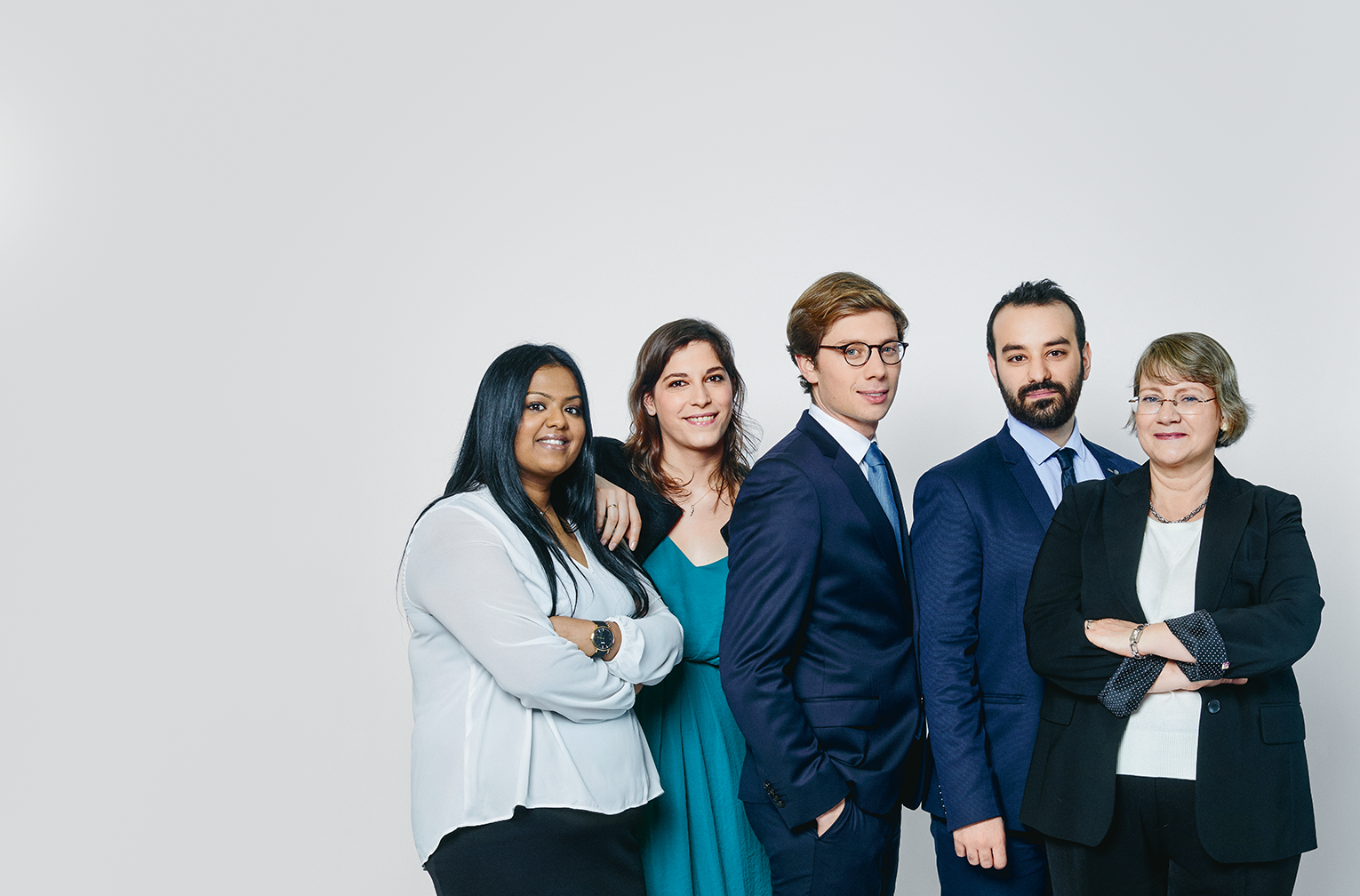
For us, the concept of commitment goes far beyond just the performance of a legal service. We are involved in our business community and in a number of converging actions with the intention to make sustainable development and the social responsibility of companies a reality.
Controlling environmental impact
Recycling and cutting down on the consumption of consumables, stationery and paper helped save 117 trees in 2017. Since 2009, we encourage travel by train, and provide a bicycle parking facility. Starting in 2011, gradually moving towards paperless invoicing. Since 2015, issuing re-usable isothermal mugs, accepted by coffee machines, to each new company member.
Skills promotion policy
Transparent skills/ranks grid, annual interviews, including for lawyers, individual and group training courses, mentoring system and referents for all profiles.
Investment in academic and public debates
Our lawyers, including several Professors and PhDs, participate in numerous think tanks and networks that contribute to the advancement of legal thinking in France and abroad: events and publications of the IBA and INTA, the Agora des Directeurs Juridiques (French forum for general counsels), CEPS [Centre d'Étude et de Prospective Stratégique], Barcelona ABS Conference, etc. They also contribute to the training of students at schools such as ESSEC and HEAD, as well as at several universities (Paris I, II, V, VII, XII, Nancy, Saint-Etienne, Strasbourg, Lyon, Evry, etc.). In partnership with the Institut des Assurances [Institute of Insurance] at Paris Sorbonne, we created an annual prize to reward a “Rising Talent in Insurance Law” about to enter the business world. In particular, we support the Sciences Po Law School.
Stakeholders in a shared world
We participate and contribute financially to the “Virades de l’espoir” running races organized by the association Vaincre la Mucoviscidose (fighting cystic fibrosis) to raise the necessary funds to finance medical research and patient care.
Lastly, we are committed to diversity and, in particular, breaking the glass ceiling: 16 of our 42 partners are female; many of our lawyers are involved in mentoring networks; we are the official sponsors of the racing driver Inès Taittinger (the only female competitor in the 2016 “24 Hours Le Mans” race); the ambassador for the second part of our advertising campaign in the national press in 2017 was a resolute young woman, who intended to represent a member of our team as well as a client or business partner.
